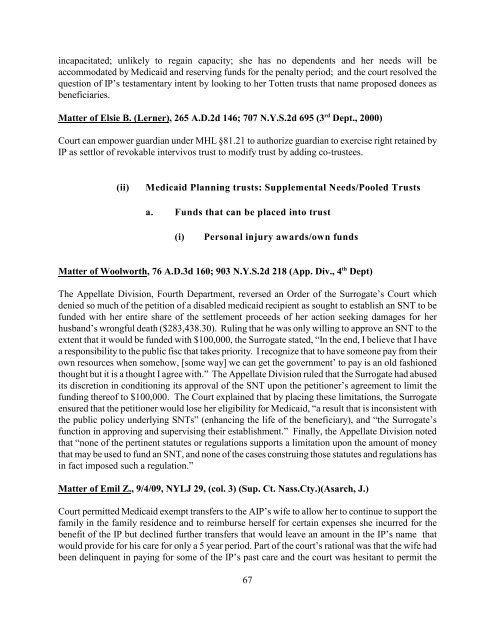MHL ARTICLE 81 - New York State Unified Court System
MHL ARTICLE 81 - New York State Unified Court System
MHL ARTICLE 81 - New York State Unified Court System
You also want an ePaper? Increase the reach of your titles
YUMPU automatically turns print PDFs into web optimized ePapers that Google loves.
incapacitated; unlikely to regain capacity; she has no dependents and her needs will be<br />
accommodated by Medicaid and reserving funds for the penalty period; and the court resolved the<br />
question of IP’s testamentary intent by looking to her Totten trusts that name proposed donees as<br />
beneficiaries.<br />
rd<br />
Matter of Elsie B. (Lerner), 265 A.D.2d 146; 707 N.Y.S.2d 695 (3 Dept., 2000)<br />
<strong>Court</strong> can empower guardian under <strong>MHL</strong> §<strong>81</strong>.21 to authorize guardian to exercise right retained by<br />
IP as settlor of revokable intervivos trust to modify trust by adding co-trustees.<br />
(ii) Medicaid Planning trusts: Supplemental Needs/Pooled Trusts<br />
a. Funds that can be placed into trust<br />
(i) Personal injury awards/own funds<br />
th<br />
Matter of Woolworth, 76 A.D.3d 160; 903 N.Y.S.2d 218 (App. Div., 4 Dept)<br />
The Appellate Division, Fourth Department, reversed an Order of the Surrogate’s <strong>Court</strong> which<br />
denied so much of the petition of a disabled medicaid recipient as sought to establish an SNT to be<br />
funded with her entire share of the settlement proceeds of her action seeking damages for her<br />
husband’s wrongful death ($283,438.30). Ruling that he was only willing to approve an SNT to the<br />
extent that it would be funded with $100,000, the Surrogate stated, “In the end, I believe that I have<br />
a responsibility to the public fisc that takes priority. I recognize that to have someone pay from their<br />
own resources when somehow, [some way] we can get the government’ to pay is an old fashioned<br />
thought but it is a thought I agree with.” The Appellate Division ruled that the Surrogate had abused<br />
its discretion in conditioning its approval of the SNT upon the petitioner’s agreement to limit the<br />
funding thereof to $100,000. The <strong>Court</strong> explained that by placing these limitations, the Surrogate<br />
ensured that the petitioner would lose her eligibility for Medicaid, “a result that is inconsistent with<br />
the public policy underlying SNTs” (enhancing the life of the beneficiary), and “the Surrogate’s<br />
function in approving and supervising their establishment.” Finally, the Appellate Division noted<br />
that “none of the pertinent statutes or regulations supports a limitation upon the amount of money<br />
that may be used to fund an SNT, and none of the cases construing those statutes and regulations has<br />
in fact imposed such a regulation.”<br />
Matter of Emil Z., 9/4/09, NYLJ 29, (col. 3) (Sup. Ct. Nass.Cty.)(Asarch, J.)<br />
<strong>Court</strong> permitted Medicaid exempt transfers to the AIP’s wife to allow her to continue to support the<br />
family in the family residence and to reimburse herself for certain expenses she incurred for the<br />
benefit of the IP but declined further transfers that would leave an amount in the IP’s name that<br />
would provide for his care for only a 5 year period. Part of the court’s rational was that the wife had<br />
been delinquent in paying for some of the IP’s past care and the court was hesitant to permit the<br />
67

















